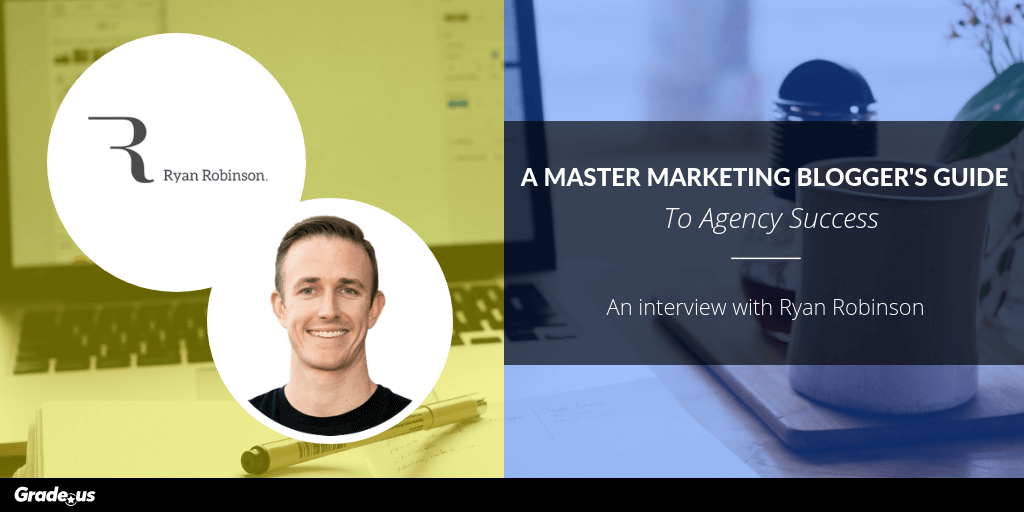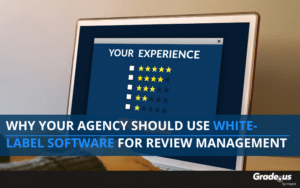Fortune 500 companies trust Ryan Robinson to manage their content strategy. And they're smart for doing so, because he built a 6-figure blog with over 400,000 readers while working a full-time job.
He's been featured in Forbes, Entrepreneur, Inc., Fast Company, and a host of other publications. And he's found ways to get his clients coverage in these publications too.
His "Side Hustle" podcast has over 120 episodes and 250,000 listeners.
If you want to know how to build a successful agency or consultancy, he's someone you'll want to hear from. His passion is teaching others to build profitable blogs and businesses, and he has plenty of insights to share.
On getting into digital marketing and starting an agency
Raney: You provide a ton of amazing advice for starting a side hustle and using content marketing.
At Grade.us, we have a lot of digital marketing consultants, SEO specialists, and just marketing agencies reading our blog.
What would be the most important thing for them to focus on when starting a marketing agency side hustle?
Ryan: I think the most important thing is to focus. For example, my strengths are really in networking and getting new business. But in the beginning, I was trying to do everything. I was trying to create content, act as a project manager, and get business.
I really wish I'd known this from the beginning.
So I'd recommend being honest with yourself right from the start about what your strengths are, and then building a team to compliment those strengths, whether it's a team you hire, a team of freelancers, or some combination of the two.
Raney: Speaking of focus, what do you recommend for someone getting into digital marketing? Do you recommend they remain industry agnostic, or that they choose a specific niche?
Ryan: When you're just getting started I really recommend choosing a niche. It grants you the opportunity to gain real expertise in a specific vector.
Choose an industry or a type of client you really resonate with. You can always expand later, but especially when you're just getting started there's really no substitute for that kind of focus.
Raney: Do you work primarily online, or do you have a service area where you can meet with clients? And which would you recommend?
Ryan: I was fortunate. I've always focused on software as service companies, and I'm in San Francisco. That meant it was pretty easy to get face-to-face meetings with the kinds of people I was doing business with.
But today, everything is digital, and there's really no reason not to work primarily online.
On content marketing and SEO for local businesses
Raney: A lot of our audience members are local business owners.
What's your best fundamental advice when it comes to creating and promoting local content?
Ryan: Take a look at the kind of content Yelp and other similar platforms are putting out. For example, if you're running an Italian restaurant, you might emulate them by writing a blog post on the Top 10 best Italian restaurants in your area.
Place yourself as #1 of course, even though you have to be a little bit careful positioning yourself in a piece like that, because you're not going to be objective there. And you might be uneasy because you seem to be promoting competitors, but you don't have to think of them that way.
This is because there's a lot of value in really owning those high-intent keywords for your local search area, and that's one of the easiest ways to do it.
Raney: In that same vein, are there specific types of organizations that you think they should be connecting with?
What types of relationships should they be building and what types of goals should they be aiming for in their local content marketing relationship building?
Ryan: When you're local there's a lot of value in just being friends with everyone in your space.
And in the local space, that's possible. They're not necessarily fighting tooth and nail to take every last customer.
For example, you could have three carpet companies in town, but one focuses on budget carpeting, one focuses on mid-range quality carpeting at reasonable prices, and one focuses on high-end luxury carpeting.
They all sell carpets, but they're not really competitors. And if you make friends with them, are willing to promote them, are willing to send referrals their way when you encounter a customer that isn't a good fit for you, then they'll do the same for you and everyone will benefit.
Raney: How can SEO and digital marketing consultants help with local clients with content?
Should they be outsourcing their own content writers and creatives? Should they be playing match makers with small businesses and putting processes in place? What do you think is the most effective business model for for these types of consultants?
Ryan: That's a strategic decision.
If you're primarily a content marketer, then you are going to want to stay in your lane and handle that for them. If you're approaching your business from a more top-level consulting perspective, you might want to set up a process. It just depends on your specific services and what your specialty is.
On identifying great clients and fleshing out your consulting business model
Raney: Are they any types of clients that side hustle marketing consultants should avoid?
Ryan: I try to work with companies who are stable and established. With start-ups, there are resources, like Crunchbase, that you can use to see how much funding they have.
If you're working with a local business, look at longevity, and the number of locations they have. A business that's been around for a decade and has five locations in town is a better bet than the business that opened their first location less than a year ago.
This helps you manage scope creep. New business owners are naturally in over their head, and when you tell them they really need something and they don't have the budget, they naturally want to try to pressure you into doing it for them, or they can't get good results because they can't do that thing.
With a more established business, when you tell them they need something and they agree, you know they have the budget to be successful, and to compensate you for your time.
Raney: What does your consultant process look like? How do you set expectations with clients?
Ryan: I always start with a contract (here’s a free one people can use), and I focus on specific deliverables.
For example: we're going to produce 5 blog posts per month. We're going to tweet something out for you 11 times each month. We'll give you two guest post mentions per month. Whatever they are.
And then I add a clause to cover the scope creep issue. I mention that we're happy to provide additional work as needed, but that a separate quote will be provided for that work.
On developing your own agency
Raney: What is the best thing that you've done?
Ryan: One of the best things I did for my business is once or twice a year, depending on how business was going, I'd double my rates.
Not for existing clients, but for new ones. And then if the new clients accepted my rates, I'd eventually go back to the existing ones and let them know that my business was growing and my bandwidth was decreasing. That my rates were going up. I'd then give them a three month grace period to adjust to the new rates.
This really helped me set the right rates for my services, which in turn helped me grow my business.
It also helped me evaluate my services a little. At the beginning I really billed myself as a freelance writer, but as I got more and more involved I realized I was acting a lot more as a freelance Director of Content Marketing. I had to learn to position myself and price myself accordingly.
Raney: Most digital marketers are self-taught, what have been the best resources that you've found to educate yourself? Where do you consistently find yourself returning to keep yourself abreast of new strategies, trends, and tech?
Ryan: My go-tos at the beginning aren't what they are now. These days I'm really fascinated with the intersection between content marketing and SEO.
So I live over at the Ahrefs blog. My bookmarks bar also includes Backlinko, gaps.com, clickminded.com, and Detailed.com.
On reviews and testimonials
Raney: What advice do you have for businesses getting reviews and testimonials?
Ryan: I like to get really granular with it.
So when I first go into a business, I'll ask them to make a spreadsheet of their top 10 or 20 customers, the people they see a lot of, that they really know. If they have a CMS system, so much the better.
Then, I direct them to start their efforts by asking those customers for reviews and testimonials. It gets much easier to expand out from there when you begin by tapping into that solid base of happy customers.
Working with Ryan
Raney: how can businesses work with you? Do you do consulting with marketing agencies? What can you offer them, and how do they find you?
Ryan: I do work with a small, select group of clients as a content marketing consultant. I'm easy to find at https://www.ryrob.com. If it's not feasible to work with me directly, people might also want to check out my free ultimate guide on how to start a blog and my new Built to Blog course, which includes everything I know about starting and growing a blog.
About the Author
Raney C. Hudson
Raney C. Hudson is an independent content consultant with a 10+ year track record in the digital marketing industry.









